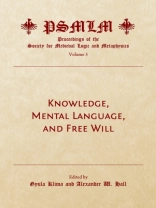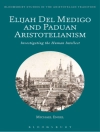Knowledge, Mental Language, and Free Will traverses the medieval philosophical landscape of metaphysics, logic and natural philosophy. Alexander W. Hall discusses Thomas Aquinas’s interpretation of Aristotle’s doctrine of per se predication as it occurs in the conclusion of scientific demonstrations, i.e., of arguments producing scientific knowledge in the strict sense. Henrik Lagerlund and Catarina Dutilh Novaes take up medieval studies of mental language in the writings of Peter of Ailly and William Ockham. Works in this genre seek to discern what concepts are concepts of, the ontological status of concepts as entities, and how concepts stand for and represent things in the world. Lastly, Walter Redmond comments on and translates the prologue to and first chapter of the Mexican Jesuit Father Matias Blanco’s (d. 1734) The Three-Stranded Cord [Funiculus triplex], where Blanco treats the antinomy between freedom and determination, modal semantics, tense logic and the logical status of counterfactuals in an attempt to reconcile human freedom with God’s causality and omniscience.
Gyula Klima
Knowledge, Mental Language, and Free Will (Volume 3 [PDF ebook]
Proceedings of the Society for Medieval Logic and Metaphysics)
Knowledge, Mental Language, and Free Will (Volume 3 [PDF ebook]
Proceedings of the Society for Medieval Logic and Metaphysics)
Acquista questo ebook e ricevine 1 in più GRATIS!
Formato PDF ● Pagine 115 ● ISBN 9781443834094 ● Editore Gyula Klima ● Casa editrice Cambridge Scholars Publishing ● Pubblicato 2011 ● Scaricabile 6 volte ● Moneta EUR ● ID 2609923 ● Protezione dalla copia Adobe DRM
Richiede un lettore di ebook compatibile con DRM












